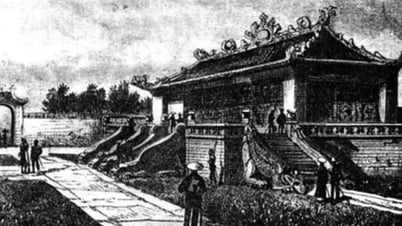
Elderly people often have difficulty falling asleep - Photo: AI
According to Dr. Tran Nguyen Quynh Loan - Nutrition Communication Education Center, Institute of Nutrition, some studies have noted the relationship between nutrition and sleep quality.
Choosing foods, eating times and a diet that provides a balance of micronutrients can help regulate sleep, helping older adults sleep deeply, get enough sleep and feel more refreshed when they wake up.
Nutrition - an often overlooked factor in elderly sleep
Dr. Loan said that the sleep of the elderly is affected by various factors such as chronic medical conditions (arthritis, hypertension, nocturia), side effects of medications (diuretics, cardiovascular drugs), psychological anxiety, unfavorable sleeping environment conditions and diet.
Among these, diet is an important factor that often does not receive due attention.
A balanced, energy-dense diet rich in protein, rich in unsaturated fats, and limited in saturated fats is thought to have a positive effect on the sleep-wake cycle.
Conversely, meals that are too high in sugar, refined starches, or hard-to-digest fats in the evening can cause bloating, difficulty falling asleep, or restless sleep, making it easy to wake up in the middle of the night.
Nutrients play different roles in sleep. Proteins include the amino acid tryptophan, which is a precursor to serotonin (also known as the happy hormone) and melatonin (a hormone that regulates sleep cycles and is released at night) - which can help improve the depth and quality of sleep naturally.
Too little protein intake can lead to tryptophan deficiency, which can lead to sleep disturbances.
However, excess dietary protein may decrease brain tryptophan levels, as this protein also contains other large neutral amino acids that interfere with tryptophan transport across the blood-brain barrier.
The same is true for carbohydrates. Dietary carbohydrates can also delay sleep onset. The quality of carbohydrates is even more important to sleep quality than the amount of carbohydrates in the diet.
Foods with a high glycemic index increase the risk of insomnia, while fiber reduces the glycemic index and slows down carbohydrate metabolism, reducing the risk of insomnia.
Additionally, research has shown that a meal high in carbohydrates eaten in the evening reduces melatonin secretion at night, affecting the body's sleep-wake cycle.
Micronutrients such as magnesium, zinc, calcium, and B vitamins - especially vitamin B6 - also affect the functioning of the nervous system and the body's circadian rhythm. Long-term deficiencies of these micronutrients can increase the risk of sleep disorders.

Ripe bananas are one of the fruits that have the effect of relaxing the nerves and aiding sleep - Illustration photo
Eating habits that help improve sleep
Elderly people should prioritize the following food groups in their daily diet:
Whole grains, oats: Provide tryptophan and carbohydrates to help increase tryptophan absorption.
Milk and dairy products : Contains tryptophan, calcium and B vitamins;
Some fruits such as ripe bananas, kiwis, papayas, apples, pears and tart cherries : Contain magnesium, vitamin B6, antioxidants and melatonin - help relax nerves, stabilize biological rhythms and improve sleep quality.
Fatty fish (salmon, sardines) : Contains vitamin D, omega-3 helps regulate serotonin.
Pumpkin seeds, almonds, tofu, dark green leafy vegetables : Rich in magnesium, zinc and fiber.
In addition, it is necessary to limit the use of foods that negatively affect sleep, such as coffee, strong tea, dark chocolate, alcohol, fried foods, and foods high in fat in the evening.
Elderly people should eat dinner at least 2 hours before bedtime, avoid eating too much or too late. Do not skip breakfast because breakfast helps regulate the biological clock and stabilize the day-night biological rhythm.
If you feel hungry in the evening, you can have a small snack (like a glass of warm milk or a few slices of banana) before going to bed. Avoid drinking too much water close to bedtime to limit the need to urinate at night.
Improving sleep quality does not necessarily depend on medication but can start with small changes in lifestyle habits, especially diet.
Maintaining a scientific diet, full of micronutrients and choosing the right foods can support better sleep, contributing to improving physical and mental health for the elderly.
Source: https://tuoitre.vn/nguoi-cao-tuoi-nen-an-gi-de-ngu-ngon-hon-20250831141914041.htm



![[Photo] Ho Chi Minh City is filled with flags and flowers on the eve of National Day September 2](https://vphoto.vietnam.vn/thumb/1200x675/vietnam/resource/IMAGE/2025/9/1/f493a66401844d4c90919b65741ec639)
![[Photo] Celebration of the 65th Anniversary of the Establishment of Diplomatic Relations between Vietnam and Cuba](https://vphoto.vietnam.vn/thumb/1200x675/vietnam/resource/IMAGE/2025/9/1/0ed159f3f19344e497ab652956b15cca)


![[Photo] President Luong Cuong receives Chairman of the House of Representatives (Lower House) of the Republic of Belarus Igor Sergeyenko](https://vphoto.vietnam.vn/thumb/1200x675/vietnam/resource/IMAGE/2025/9/1/a67d61e41405410999a43db45a0ba29c)
![[Photo] Chairman of the National People's Congress of China Zhao Leji visits the Ho Chi Minh Mausoleum](https://vphoto.vietnam.vn/thumb/1200x675/vietnam/resource/IMAGE/2025/9/1/45b2a2744fa84d27a59515b2fe53b42a)





























































































Comment (0)